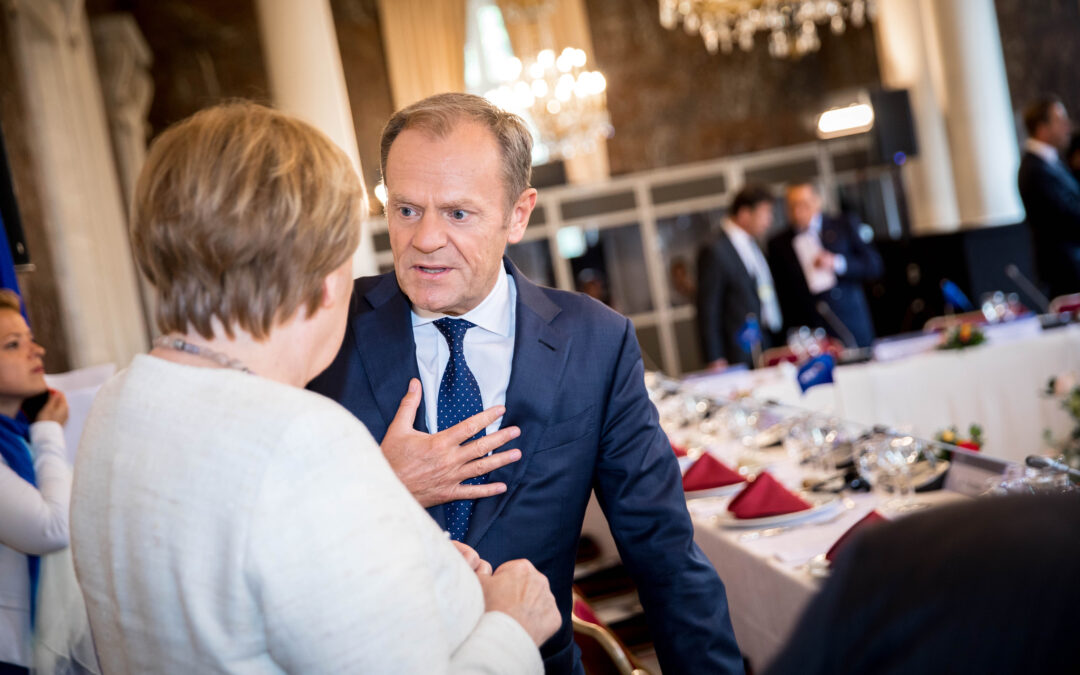Donald Tusk, the newly appointed acting leader of Poland’s main opposition party, has accused the country’s government of “implementing Putin’s agenda” by allying with pro-Russian parties in Europe and of “destroying the church” by turning it into a “political tool”.
At his first major press conference since returning to domestic politics at the weekend, the former European Council president took questions from a range of media outlets for around 90 minutes.
Tusk said that the ruling national-conservative Law and Justice (PiS) party had consigned Poland to a “clearly pro-Putin political camp in the EU” by signing a joint declaration on “the future of Europe” with Marine Le Pen, Viktor Orbán and Matteo Salvini, all of whom are seen as sympathetic towards the Kremlin.
"We do not want these [cultural] revolutions, we see them as a venture that will only bring many misfortunes and radical limitation of freedom," Kaczyński said.
The text "accepts the idea of the EU" but "warns of all the alarming phenomena and emphasises sovereign nations"
— Notes from Poland 🇵🇱 (@notesfrompoland) July 2, 2021
Jarosław Kaczyński, PiS’s chairman and Poland’s de facto leader, had “made a decision to enrol PiS, and this means, in a sense, to enrol Poland” into a camp of parties who “do not hide their aversion towards a united Europe, and that do not hide their nationalist anti-EU tendencies”, said Tusk.
“For some unknown reason, Kaczyński and PiS have insisted on implementing Putin’s political and international agenda in Poland and in Europe point by point, both when it comes to domestic and foreign policy,” he continued.
He suggested that government policies that have caused Poland to move away from the EU’s political mainstream were prompting Putin to “open another [bottle of] champagne”. He said these could have “irreversible consequences” for Poland’s security and international position.
Headlines on the main evening news of Polish state TV (a government mouthpiece):
– "Tusk's return pleases the Germans" (the report showed no evidence of Germans being pleased)
– "Tusk in the club of Putin's friends" pic.twitter.com/hqHssNOi98
— Daniel Tilles (@danieltilles1) July 4, 2021
PiS presents itself as a strongly anti-Russian party. Kaczyński himself warned in 2019 that Le Pen’s National Rally party is a “good example of…political formations operating in individual [EU] countries that are obviously linked to Moscow and receive its support”.
Yet in recent times PiS, which has long enjoyed close relations with Orbán’s Fidesz party, has moved closer to other European parties seen as friendly towards the Kremlin, including Salvini’s Lega, which is an official partner of Putin’s United Russia party and is accused of seeking illegal Russian funding.
In March this year, Poland’s PiS prime minister, Mateusz Morawiecki, met with Orbán and Salvini in Budapest to discuss closer cooperation on a shared vision to “rethink Europe’s identity”.
During his press conference, Tusk also discussed the recent troubles of the church in Poland. Around 90% of Poles are officially classified as Catholic, but a series of child abuse scandals and anger over a near-total abortion ban have accelerated a decline in trust towards and attachment to the church.
“I am a Catholic and I have no problem saying it clearly and loudly,” said Tusk. “Do not be persuaded that the church is being attacked by Polish social democrats or liberal-minded people, or by Polish youth or women who want their rights or their freedoms.”
“There are forces within the church that are destroying it,” he continued, especially the “inability to talk seriously about paedophilia”. But “there are also forces that destroy the church from the outside [and] PiS and Kaczyński are the best examples of this.”
“The appropriation of the church by politicians is a fatal blow,” Tusk concluded. “Something terrible is happening and it is everyone’s duty to protect the church from itself, and certainly to protect it from the party that has appropriated it and made it a political tool in its hands.”
While speaking to the press, Tusk also admitted to the “mistake” his government had made in 2012 by raising the retirement age, a policy that was unpopular and later reversed by PiS after it came to power.
Tusk, who served as prime minister from 2007 to 2014, announced his return to domestic politics on Saturday, when he was appointed as acting leader of the Civic Platform (PO), which he founded 20 years ago and is currently Poland’s largest opposition group.
“Today, evil rules in Poland, and we are going out onto the field to fight this evil,” he said, referring to the rule of PiS and his longstanding rival Kaczyński, who on the same day was re-elected for what he claims will be his final term as chairman of his party.
Main image credit: European People’s Party/Flickr (under CC BY 2.0)

Maria Wilczek is deputy editor of Notes from Poland. She is a regular writer for The Times, The Economist and Al Jazeera English, and has also featured in Foreign Policy, Politico Europe, The Spectator and Gazeta Wyborcza.




















